Or, rather, does it work on Alex?
This guy Rob Ager offers his view here:
http://www.collativelearning.com/ACO%20chapter%2010%20.html
And here, talking of Alex's deceit:
http://www.collativelearning.com/ACO%20chapter%2011%20.html
I personally think it does work on Alex- whether or not it's realistic is not the point.
1/ Alex isn't turned into a nice, good-hearted person, nor meant to be, after the treatment. That's why he behaves quite aggressively when returning home and has the urge to hit Joe, and only when he puts up his wrist, does he feel the sickness. All the treatment does is to make him have a reaction when he's about to hit somebody. Which means he has no moral choice. Which means it's all the reaction of the body.
2/ Alex may be putting on an act when seeing his parents and Joe after his release, but pretending to endure being beaten by the gang of beggars would be difficult for a violent, aggressive, hateful, antisocial person like him.
3/ Alex doesn't have an aversion to all music- this is 1 of the differences between the film and the book. Hence, he can sing "Singing in the rain" in the bathtub and feel OK about it even though he used to sing it while attacking the writer and raping his wife. On 1 hand it may be seen that "Singing in the rain" can be associated with violence as much as Beethoven's 9th symphony. On the other hand one can say that only the 9th symphony is played during the treatment and therefore his brain only connect the nausea with the 9th symphony.
4/ Alex seems to have a natural reaction to the 9th symphony. As a matter of fact, he jumps off the building. Of course, one can say nobody dies jumping from such height (and Alex knows he will not), but still, it does hurt. His reaction seems natural enough.
However, Rob Ager does have a point. His arguments are certainly interesting, and to me this is quite unsettling, because of the sense of uncertainty.
_________________________________________________________
Another article by Rob Ager on the symbol ∆ in the film:
http://www.collativelearning.com/ACO%20chapter%2012%20.html
I did not notice this at all.
Some of the examples presented may be accidental- resulting from one-point perspective, which Stanley Kubrick often used. But some of them can't be. Such as:





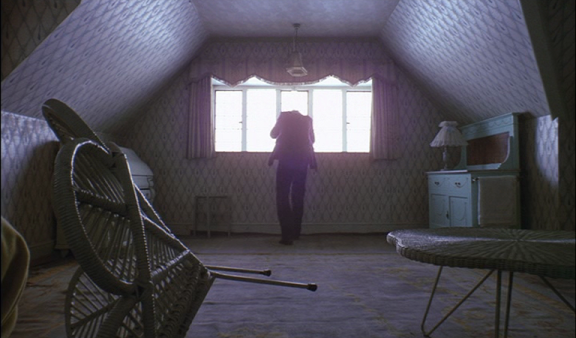
However, Rob Ager suggests Maslow's hierarchy of needs:
I myself would suggest something like the pyramid of social classes in feudal society:

Or just a random pyramid of social classes:

The question is why.
I agree, there's hardly a sense of class in "A clockwork orange", but the main idea is that the "abuser" is at the top. Now, look back at the film- in these scenes the abuser's at the apex of the pyramid figure:




Also, look at the structure of the writer's house. When Alex and his friends enter the house and attack the couple, they emerge from the apex.

Later, the writer and his friends, who will 'abuse' Alex, also emerge from the apex.
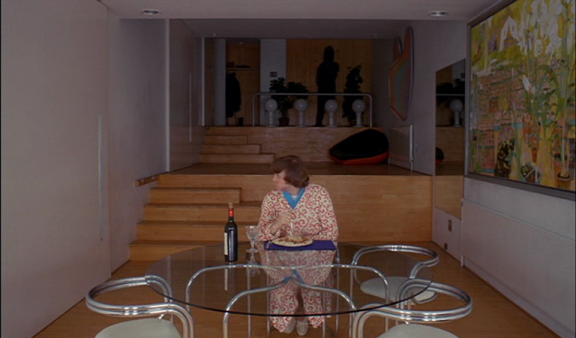
This is particularly significant.
The pyramid also appears in the posters:



Now, this can't be accidental. See?
How about this?

Now this is more interesting.
Everybody remembers his right eye and the false eyelashes:
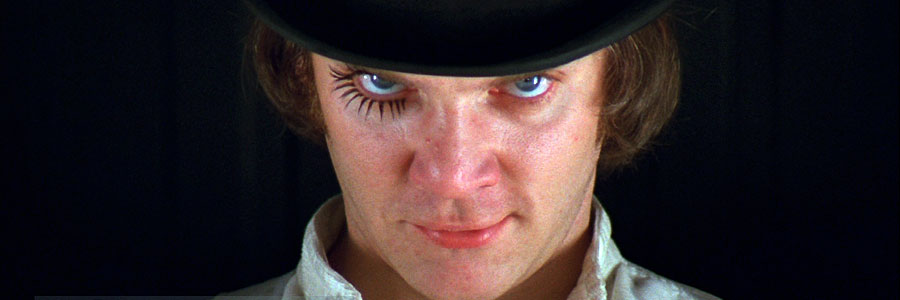
And his eyeball cufflinks:

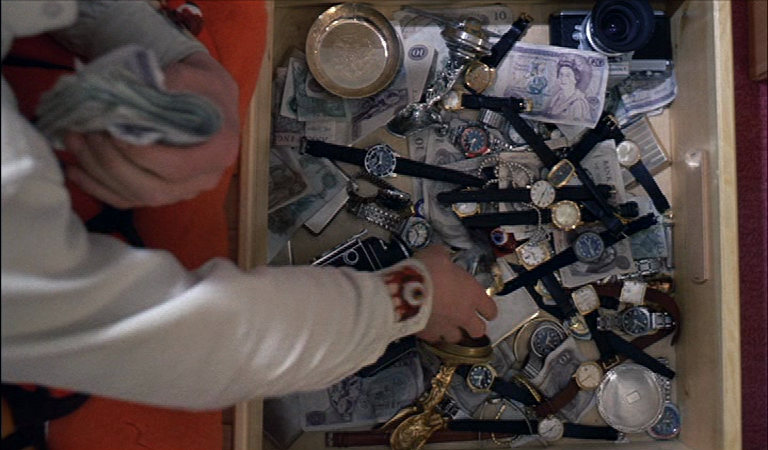
What is this supposed to mean?
Rob Ager discusses the symbol of the eye here:
http://www.collativelearning.com/ACO%20chapter%2014%20.html
_________________________________________________________
"A clockwork orange" may be seen as referring to Nazi society. I did notice that Chief Officer Barnes looked like a Nazi. He exaggerates movements and shouts everything and marches like a Nazi. Rob Ager argues for it here:
http://www.collativelearning.com/ACO%20chapter%2017%20.html
All the important points and arguments are included there, I think, except 1 crucial point- the Ludovico treatment reminds me of eugenics and the concept of a master race in Nazism, the 'removal' of inadequate/ inferior people and the attempt to create a society of 'ideal' Nordic people who look the same, who think the same, who act the same.
At the same time, it may also be referring to Soviet society. Alex's slang has heavy Russian influence and the painting in Alex's house seems to have socialist style:

Obviously, there's also brainwashing in the USSR and the communists also want everybody to think the same and act the same (and at some point, to look the same as well, as they dressed pretty much the same). The way the writer talks, which may be overlooked by many people, sounds very socialist (eg, he keeps calling Alex the victim of the technique, the victim of modern age, etc). The red armband also exists in communist countries- remember sao đỏ?


So it can be both. Kubrick himself said: "The Minister, played by Anthony Sharp, is clearly a figure of the Right. The writer, Patrick Magee, is a lunatic of the Left... They differ only in their dogma. Their means and ends are hardly distinguishable."
_________________________________________________________
http://www.collativelearning.com/ACO%20chapter%2007%20.html
Here in this chapter Rob Ager discusses "an eye for an eye" in the film. Tons of examples, indeed.
_________________________________________________________
http://www.collativelearning.com/ACO%20chapter%2018%20.html
Some of the points here are a bit too far-fetched, too forced, about which I don't have an opinion, except:
1/ The spaghetti meat on Alex's face does look like Hitler's moustache:

2/ The idea of double isn't entirely implausible. Whatever the case it's interesting to point out the repetitions and parallels and the placement of the mirror.
_________________________________________________________
http://www.collativelearning.com/ACO%20chapter%2009%20.html

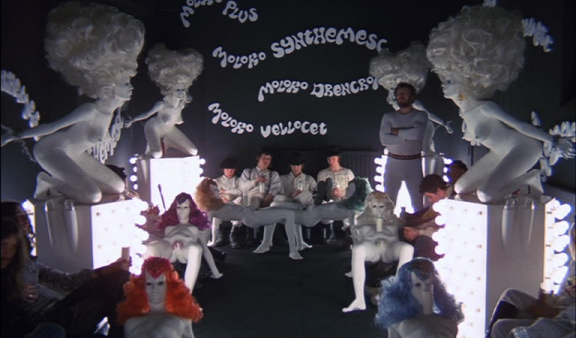
See the similarity?
That chapter is about symbols of sexual abuse, this one is about hints of homosexuality:
http://www.collativelearning.com/ACO%20chapter%2008%20.html
Obviously, Stanley Kubrick films aren't meant to be watched once, but many times. Pay attention to the details. I only see things on the surface.
There's more to be discussed. But I think that's enough for the day.
STANLEY KUBRICK'S AWESOME!
No comments:
Post a Comment
Be not afraid, gentle readers! Share your thoughts!
(Make sure to save your text before hitting publish, in case your comment gets buried in the attic, never to be seen again).